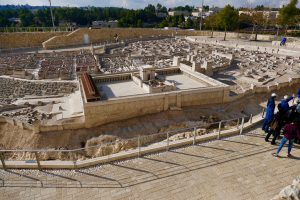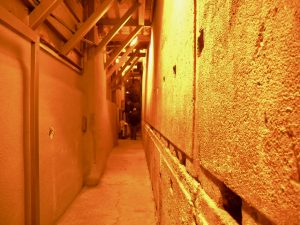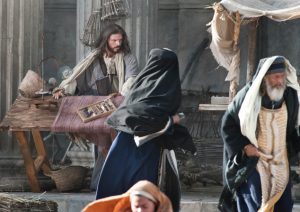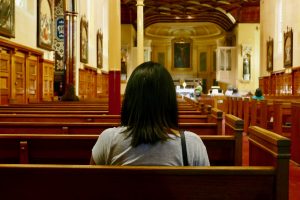Living Temples of the Word
(1 Macc 4:36-37; 52-59; Ps29; Luke 19:45-48)
********************************************
When was the last time you were spellbound by someone’s words?
Today’s liturgy extends a double invitation to us: not just to be “spellbound” by the words of Jesus, but to actually be a temple of the Word.
Both readings focus on the temple. That was the center of the cultural, political and spiritual life for the ancient Israelites after the first temple was built by King Solomon. Before that, God journeyed with God’s chosen people in a tabernacle in a tent. The temple was where God dwelt, where God was present here on earth.

Model of the Temple, East wall
But there is a zinger tucked into the readings in the last lines of the gospel. “Everyday Jesus was teaching in the temple,” and “the people were spellbound by what they heard.” So now there is a double focus to the readings: the temple and the word.

Foundation of the Western Wall of the former temple in Jerusalem
In the first reading, the glorious temple had been desecrated by the Gentiles, a desolating disgrace to the Jews. Once the Maccabees had overcome their enemies under Mattathias and his son Judas, the first order of business was the restoration of the temple, with joyful fanfare that would become an annual celebration.
In the gospel, the temple has also been desecrated, only now it was by the Jews themselves who had turned it into a place of commerce with the sale of sacrificial animals and birds. Worse than that for Jesus, it had also become a source of injustice to the poor, who were being gouged by the jacked-up prices of the sacrifices they were forced to buy. No wonder Jesus was filled with righteous anger and cleansed the temple.
Actually, that was also historically fitting, because one of the roles of the Messiah when he would come was to restore the glory of God to the temple – the shekinah of God that had failed to come back to the second temple when it was dedicated. In John’s account of this incident, Jesus actually refers to himself as the temple where God dwells (“Destroy this temple and in three days I will raise it up.”)

What is striking is that in almost the same breath, Luke mentions that Jesus was also “teaching in the temple every day.” That is significant, because that puts the focus on the Word of God within the temple walls. Especially significant was that the common people, unlike the scribes and Pharisees, the learned ones who should have known better, hung onto Jesus’ words.
Jewish religious life was centered on two pillars: the temple and the synagogue. The temple was where animal sacrifice took place to please God, and the synagogue was where the Word of God, the Torah, was proclaimed and discussed. The fact that Jesus was continually teaching in the temple was a bringing together of the Word of God with sacrificial worship.
It is very interesting that our Eucharist does exactly the same thing – bring together the Word of God with sacrificial worship. The Liturgy of the Word is our synagogue experience, in which we proclaim and break open that Word. Then we move to the table of the Eucharist, where we present to God not animal sacrifices that cannot take away sin, but the sacrifice of the Lamb of God whose gift of his life on the cross does take away the sin of the world.
Our task is to allow ourselves to be touched, profoundly moved, even healed by the power of the Word of God. We need to be “spellbound” by the words of Jesus. One way to do that is to practice Lectio Divina – prayerfully reading God’s word; meditating on it and asking ourselves what God is saying to us this day through that word, praying with that word for our needs and the needs of the world, and finally, must resting in God’s presence in the light of that word, allowing God to do within us whatever God wants to do within us at that moment.
To do this daily and consciously, is to carry the Word of God within us, to ponder it as Mary pondered these things in her heart. We then become temples of the Holy Spirit, where God dwells here on earth. That actually flows from the event of Pentecost, when the shekinah or glory of God did come back to the temple – not a physical temple in a geographical location, but the temple of the early Christians gathered in the upper room, that birthed the Church and transformed our ancestors in faith into the Body of Christ.
Someone who is a good example of being a living temple of the Word has to be Richard Rohr OFM, who each Lent goes into a hermitage just to be present to the Word, to soak up the teachings of Jesus, to integrate those teachings into his very being, his thinking, feeling and acting. He then spends the rest of the year spreading the fruit of that being present to the Word to the rest of the world, speaking, writing, teaching, guiding the men’s movement Illuman, and running a Living School out of his Center for Action and Contemplation in New Mexico.
Here is a portion of his daily meditation for today:
“The presence of God is infinite, everywhere, always, and forever. You cannot not be in the presence of God. There’s no other place to be. It is we who are not present to Presence. We’ll make any excuse to be somewhere else than right here. Right here, right now never seems enough. It actually is, but it is we who are not aware enough yet.
As a Franciscan, I have many opportunities to go away for long periods in solitude. When I’m in a hermitage, there’s no television, smart phone, computer, or radio. There’s pretty much nothing but the natural. You’d think it would be easier to be present to Presence in this setting, and in some ways it is—watching the snow fall, listening to a hawk’s cry, walking slowly without any particular destination or deadline. But I can’t escape my monkey mind even on retreat. Daily contemplative prayer is crucial to helping me live in the now. It takes constant intention and practice to remain open, receptive, and awake to the moment.

We live in a time with more easily available obstacles to presence than any other period in history. We carry our obstacles in our pockets now, vibrating and notifying and emoji-ing us about everything and nothing. And let’s be honest: most of our digital and personal conversation is about nothing. Nothing that matters, nothing that lasts, nothing that’s real. We think and talk about the same things again and again, like a broken record. Pretty soon we realize we’ve frittered away years of our life, and it is the only life we have.
We have to find a way to more deeply experience our experiences. Otherwise we’re just on cruise control, and we go through our whole life not knowing what’s happening. Whether we realize it or not, the divine energy of God is flowing through each one of us. When we draw upon this Source consciously, our life starts filling with what some call coincidences or synchronicities which we can never explain. This has nothing to do with being perfect, highly moral, or formally religious. I wish someone had told me that when I was young. I would still have been religious, but now in a whole different way—and all the time.”
As stated earlier, the Eucharist is both synagogue and temple, bringing together the word and sacrificial worship.
May our celebration empower us to respond to that double invitation: to continually be spellbound by Jesus’ words, and to be living temples of the Word in our world, everywhere and every day.




I am grateful for all,the homilies you have shared for everyone especially your description about the temple and what is this place. It is not a supermarket where you can place products anywhere and sale it to people like being on the streets. The temple is where Jesus Christ is present when the Eucharist is inside the tabernacle. We need to worship and pray and bow when we enter the temple. It is like being in the temple of God, we need to notice and respect who is present. We should not talk and turn on cellphones when being in the chapel. The temple is basically the chapel. Everyone seems to forget about this ritual. Thanks for homily Bishop.
Well yes , the Eucharist is part of the synagogue and temple because you offer it God. The Eucharist turns in the bread of Christ and the wine is the blood of Christ which is the New Covenant. It is like sacrificing the Lamb of God and offering it to God which takes away the sins of world. Jesus is suppose to preach the word of God in the temple and spread the message to people. You will always be young with all the lovely homilies you are writing for people. Blessings!